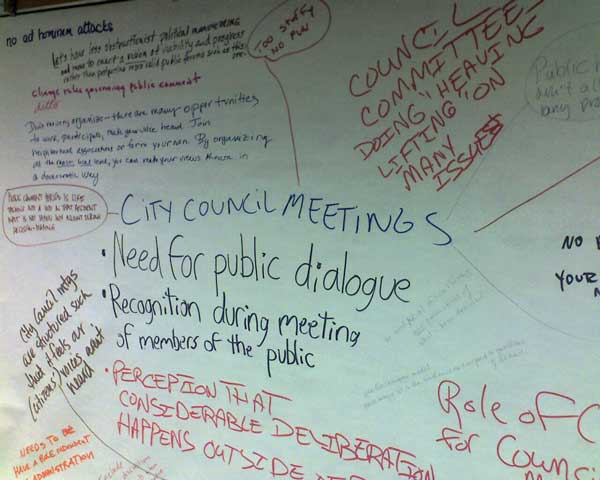Here is a complete blip.tv video of last night’s organizational meeting of Northampton’s Charter Review Committee. The committee members include Councilor Jesse M. Adams, Councilor Marianne L. LaBarge, Councilor David A. Murphy, Colleen Currie, Alan Seewald, Margaret Striebel, and Samuel Welson (who was elected chair). The video is 2 hours 4 minutes long and was recorded by Adam Cohen.
Here is a 10-minute YouTube excerpt of the committee debating the scope of its mission. Some members are inclined to recommend a wholesale rewriting and modernization of the charter. Others want to prioritize specific changes such as term limits and the role of the mayor at City Council meetings.
Seewald: “I came away from this charter saying, ‘This thing needs to be built from the foundation.’ We need an entirely new charter… It just seems so disjointed.”
Here is another 10-minute YouTube excerpt where the committee debates how to solicit input from the public. Some members want to invite public input at every meeting. Others prefer a more organized approach for greater efficiency.
Adams: “I absolutely disagree [with trying to channel most public comment into a single big forum as opposed to also making a regular place for public comments at the committee’s business meetings]… I think that that serves an extremely valuable function, having people come before our business session [at City Council]…and letting it be open to the public. I absolutely think that we should begin with public comment.”
The Charter Review Committee’s next meeting will take place on Wednesday, May 26 at 7pm. Check the City Calendar for details as that date approaches.
See also:
Video: Bay State Village Forum for At-Large City Council Candidates, 10/21/09
Jesse Adams: “What I would give priority to would be to review the city charter. I believe that we have a very strong mayor form of government that is antiquated–that is by design of the charter. We have a mayor who chairs the council, the mayor chairs the finance committee, mayor chairs EDHLU, and I think that with a better separation of powers, with more power to the council, I think the whole city will benefit.”
Video: Bay State Village Forum for Mayoral Candidates, 10/21/09; Term Limits; North Street Condo Proposal
Clare Higgins: “We have term limits. It’s called the ballot box… I don’t think that term limits necessarily are helpful… I also think my opinion is less important than what the full citizenry’s opinion is, and that’s something that, if we do a charter review, that may be very well what is one of the things that is taken up in a charter review process.”
Michael Bardsley: “For the executive position, yes, I do support term limits, comparable to what we have for the national government… Running for office is very difficult. Running against an incumbent is even more difficult. It’s a lot of time. It’s a lot of money… We need term limits. It’s healthy for the community to force an election periodically and have a change…”
Best Practices Meeting of November 12: Video; Discussion of Term Limits (11/15/08)
…some suggestions saw disagreement, notably term limits for elected and/or appointed officials, which were touched on during 2:29:50-2:34:57 [Wendy Foxmyn spoke in favor of term limits, Ward 3 City Councilor Bob Reckman opposed them].
“Power at the Local Level: Growth Coalition Theory”
The reforms were put forth as part of the ideology of “good government,” which meant “efficient,” “businesslike” government by experts and technicians, as opposed to the “corrupt,” “machine-dominated,” and “political” government alleged to exist in a growing number of cities. The new movement claimed to make government more democratic and less boss-dominated, although the actual effect of the reforms was to increase the centralization of decision making, remove more governmental functions from electoral control, and decrease the percentage of workers and socialists elected to city councils.
These reforms and their effects are as follows:
…Off-year elections. It was argued that local elections should not be held in the same year as national elections because city issues are different. What this reform did was to break the many policy connections between local and national levels, while at the same time reducing voter turnout for local elections, thereby favoring conservative candidates…
Elimination of salaries for city council members. It was argued that serving on a city council should be a civic service done in a volunteer fashion in order to eliminate corruption and self-serving motives for seeking office. The effect of this reform was to make it more difficult for average-income people to serve on city councils because they could not afford to do so…
Video: Presentation of Final Recommendations of the Best Practices Committee to City Council, 3/5/09
Download the recommendations online or view reference copies at Forbes Library, Lilly Library, and at City Hall in the offices of the City Council, Mayor, and City Clerk.
Best Practices: Pictures and Video from the May 13, 2008 Public Forum
